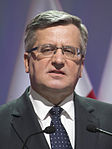Polish presidential election, 2015
|
|
|||||||||||||||||
|---|---|---|---|---|---|---|---|---|---|---|---|---|---|---|---|---|---|
|
|||||||||||||||||
| Turnout | 48.96% (first round) 55.34% (second round) |
||||||||||||||||
|
|||||||||||||||||
|
|||||||||||||||||
Presidential elections were held in Poland on 10 and 24 May 2015. In the first round of voting, opposition Law and Justice (PiS) candidate Andrzej Duda received the greatest number of votes with a share of 34.76%, followed by incumbent president Bronisław Komorowski (with 33.77%), who ran as an independent with the endorsement of the Civic Platform (PO), which he had renounced his membership in after winning the 2010 elections. Independent candidate Paweł Kukiz came third with 20.80% of the votes. As no candidate had received more than 50% of the votes cast, a second round was held on 24 May between the two highest-placed candidates, Duda and Komorowski. This round was won by Duda with 51.5% of the votes, to Komorowski's 48.5%. This was the closest presidential election in Polish history.
The victory of Duda's Law and Justice party was one of the latest in a series of electoral victories for eurosceptic centre-right and right-wing parties in Europe. His party received strong support in the eastern half of the country closest to Ukraine and had campaigned on a platform of tax cuts, continued privatization, continued social welfare spending, anti-corruption, constitutional reform, increased military spending and closer ties to NATO, limited support of EU integration, and restrictions on abortion, euthanasia, legal recognition of homosexual couples and media portrayals of sex and violence.
The president was elected directly by the people to serve for five years, and can be re-elected only once. Pursuant to the provisions of the Constitution, the president had to be elected by an absolute majority of valid votes; if no candidate succeeds in passing this threshold, a second round of voting is held with the two candidates who received the largest and second largest number of votes respectively.
...
Wikipedia


